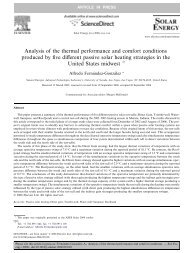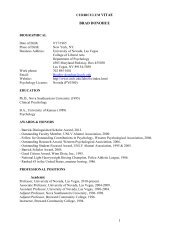2013 Conference Proceedings - University of Nevada, Las Vegas
2013 Conference Proceedings - University of Nevada, Las Vegas
2013 Conference Proceedings - University of Nevada, Las Vegas
- No tags were found...
Create successful ePaper yourself
Turn your PDF publications into a flip-book with our unique Google optimized e-Paper software.
to get started and persistence. Teachers said many students did not understand the problems theyhad to solve. At the end <strong>of</strong> the semester teachers found many <strong>of</strong> the problems they encounteredwith their students in the beginning <strong>of</strong> the semester still persisted. Teachers felt there wereseveral things they could do to help improve their students’ problem-solving abilities and skills.Most commonly mentioned were the steps to problem solving as outlined by Polya (1945).Teachers commonly said that scaffolding and differentiated instruction could be used to helpimprove problem solving in their students.At the beginning <strong>of</strong> the semester teachers reported that they shared many <strong>of</strong> the issues thattheir students have such as knowing how to start, persistence, understanding what the problem isasking. At the end <strong>of</strong> the semester, most teachers said that having the algebra content class thatfocused on derivations and pro<strong>of</strong>s had improved their problem-solving abilities greatly. Severalused the phase, “I have come a long way,” referring to their problem-solving abilities. Many saidthat it was the analytic nature <strong>of</strong> derivations and developing pro<strong>of</strong>s that helped improve theirproblem-solving abilities. Additionally, many found understanding how mathematics “works” inthe class furthered their analytic skills.Conclusions and Educational ImplicationsSince there was an increase in problem-solving scores over the course <strong>of</strong> the semester it canbe argued that the a strong mathematics requirement for alternative certification mathematicsteachers, combined with their own teaching experiences, can lead to stronger problem-solvingachievement, which is important given the emphasis <strong>of</strong> teaching mathematics from a problemsolvingperspective (Clark, 1997; NCSM, 1978; NCTM, 2000; Posamentier et al., 2008). Futureresearch should examine how much <strong>of</strong> this is due to the effects <strong>of</strong> content classes for teachers orhow much is due to the effects <strong>of</strong> their teaching experience, particularly in alternativecertification programs.Teachers perceived that students did not persevere in their problem solving because theywere reliant on the teacher giving them the solutions in previous years. While this reliance onteachers providing solutions may be partially due to negative attitudes toward problem solvingheld by the students (Arslan & Altun, 2007), it also could be a problem with teachers not givingenough time for students to engage in problem solving. Perhaps there is a need to give studentsmore time in their problem solving, and to resist the temptation to simply “give” the solutions tothe students. This should be further investigated.<strong>Proceedings</strong> <strong>of</strong> the 40 th Annual Meeting <strong>of</strong> the Research Council on Mathematics Learning <strong>2013</strong> 4




